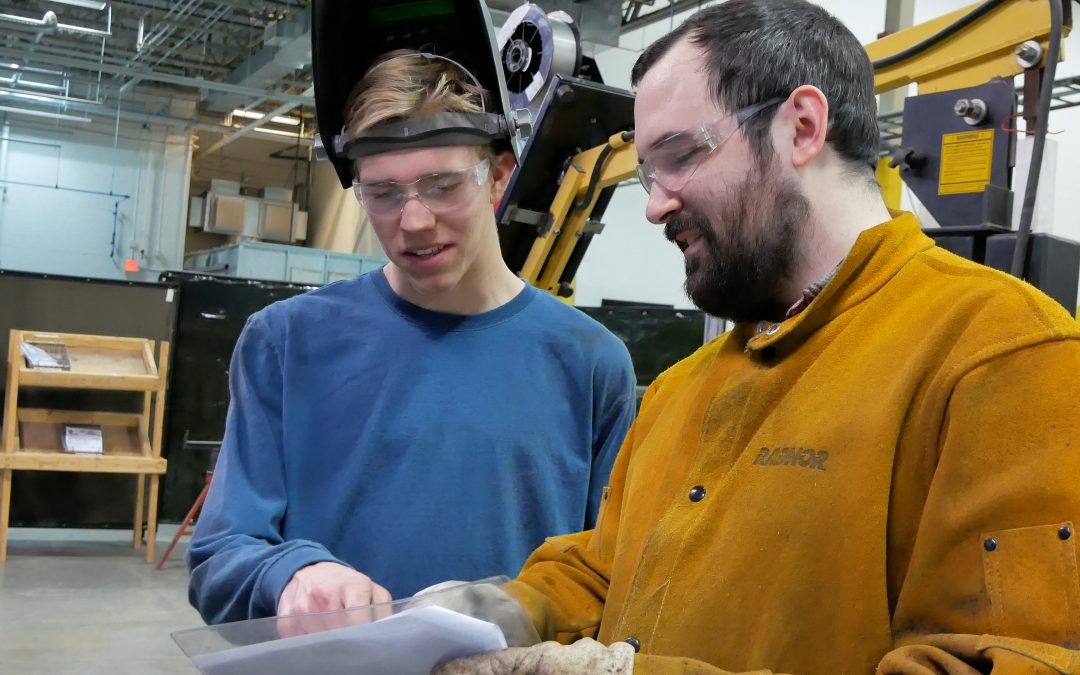
Mar 19, 2021 | Apprenticeships, Students
One of the value propositions behind Career and Technical Education (CTE) in New Hampshire is to provide hands-on learning for high school students, an objective that often involves industry partners.
“We work with industry to create real work opportunities for students,” said Rich Paiva, Career Development Coordinator at Wilbur H. Palmer CTE Center, who helped launch an internship program in welding two years ago.
This program involves Spraying Systems Co. in Merrimack.
“Before the pandemic, we had students tour their facility during Manufacturing Month in New Hampshire,” explained Paiva. “The students met the welders and were able to ask questions.”
One student, Shea Williams, found some answers.
“Between the program and the tour, he realized this was the career path for him,” said Paiva.
This realization led to a conversation with Joe Ruelas, Vice President Operations at Spraying Systems Co., and ApprenticeshipNH.
“We had to work out some details and how we could combine our program with the time spent at Spraying Systems so Shea could earn high school credits while over there,” explained Paiva.
This creative arrangement enabled the hours Williams spent in the welding program to roll over into a full apprenticeship at Spraying Systems after he graduated from school last June.
“Spraying Systems is now sending him to Manchester Community College for an Associate’s degree,” Paiva said. “It is going great.”
Ruelas agreed.
“Shea has done very well for us,” he noted. “He has willingly accepted being trained on everything. He has a good work ethic and, most importantly, works well with others. He will one day be a good welder, hopefully, for our company.”
Citing his working relationship with Paiva as a big reason why Spraying Systems Co. developed apprenticeships, Ruelas said there are several advantages to creating them.
“One is to provide students the opportunity to learn a trade or skill in manufacturing,” he explained. “The other is to create and maintain a culture at our company of passing on knowledge to less experienced people and people who strive to learn more. The last one is to help improve the community.”
As for how his apprenticeship experience has been at Spraying Systems, Williams said it “has been awesome.”
“I am able to learn lots about my chosen trade of welding,” he said. “I am also being trained how to do many other procedures in manufacturing, such as sandblasting, pressure testing, and even some machining. I enjoy the company of my coworkers, and I enjoy the work I do.”
The experience for Williams is priceless.
“The best part of the apprenticeship is being able to get up in the morning and do something that I enjoy doing and can take pride in,” he said. “Welding is something that I enjoy putting a great deal of effort into, and being given the opportunity to learn and get job experience at the same time is something I am certainly grateful for.”
According to Paiva, Williams’ experience is “a textbook example of CTE.”
“We are here to help students explore career pathways, and Shea’s experience is possible through innovative partnerships with external stakeholders and industry,” he said. “Everyone benefits with CTE.”
Wilbur H. Palmer CTE Center is one of nearly two-dozen CTE centers throughout the state of New Hampshire.

Apr 24, 2019 | Apprenticeships, Leadership
On Monday, May 13, dozens of educators and industry leaders are expected at Business Roundtable: Apprenticeship as a Workforce Solution, hosted by Apprenticeship NH and NHTI, Concord’s Community College.
According to Amie L. Pariseau of the New Hampshire Lodging & Restaurant Association, the apprenticeship model is important in NH.
“Apprenticeships can assist employers who are struggling with workforce shortages by connecting them to students who are currently enrolled in Career & Technical Education or Community College programs,” she said. “Employees can also choose a current employee who shows potential that they want to foster growth in.”
Apprenticeship can also serve as a recruitment and retention tool.
“It’s a way for businesses to ensure they have a continuous pipeline of employees with the specific skills and training needed for the industry,” she added.
Al Lawrence, founder of Artisan Electric in Madbury, NH agrees and said the apprenticeship model also “does something a traditional education cannot do.”
“I’ll pay you to learn,” said Lawrence, who said he offers a paid four-year apprenticeship at his company.
His belief in and support of the apprenticeship model results from his appreciation for the outcomes it tends to generate within those who complete it.
“It is more than technical proficiency and skills — and, of course, that is important,” he said. “In the apprenticeship model, you are putting someone to work in the field to learn and experience it. In our program, we focus on developing skills like leadership, problem solving, communication and how to be a good team member.”
Such skills, said Lawrence, are generally lacking in today’s incoming workforce.
“Honestly, a lot of business owners like me are approached by people looking for a job, and the first thing they want to know is what is in it for them,” he said. “As an apprentice, I try to re-frame that and teach the person the skills we need them to have in this industry. They need to deliver value to the company.”
At Business Roundtable: Apprenticeship as a Workforce Solution, Pariseau said the goal of the event is to break down the structure of apprenticeship and discuss five key components: business involvement, structured on-the-job training, classroom instruction, rewards for skill gains and national credential.
“We hope to find employers to engage in the conversation about making apprenticeship part of their strategy to tackle their workforce challenges,” she said.
ApprenticeshipNH is a US DOL grant-funded program housed at the Community College System of NH that helps employers in high-demand industries build registered apprenticeship programs.
“They’ve been hosting roundtable discussions across the state in hospitality and other sectors as well, such as manufacturing and healthcare,” she said.
According to Lawrence, such discussions, while useful, just scratch the surface of a comprehensive solution.
“The larger question many of us face–whether it is the hospitality industry or the trades–is how do we attract young people?” he said. “How do we get kids excited about these industries, because many of us are struggling to handle the work we have now, and New Hampshire has a workforce that continues to age.”
To RSVP for Business Roundtable: Apprenticeship as a Workforce Solution, email apprenticeshipusanh@ccsnh.edu, or call 603.230.3526.


